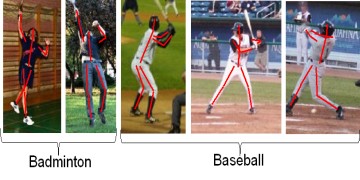Iterative Action and Pose Recognition
using Global-and-Pose Features and Action-specific Models


This paper proposes an iterative scheme between human action classification and pose estimation in still images. For initial action classification, we employ global image features that represent a scene (e.g. people, background, and other objects), which can be extracted without any difficult human-region segmentation such as pose estimation. This classification gives us the probability estimates of possible actions in a query image. The probability estimates are used to evaluate the results of pose estimation using action-specific models. The estimated pose is then merged with the global features for action re-classification. This iterative scheme can mutually improve action classification and pose estimation. Experimental results with a public dataset demonstrate the effectiveness of global features for initialization, action-specific models for pose estimation, and action classification with global and pose features.